Minister of Culture Tõnis Lukas: Estonia should be one big Estonian Language Centre
Are places on free Estonian language courses only offered in August?
Where next after Estonian Language Centre first academic year?
How to make the most of cultural diversity?
How to study Estonian in beach weather?
Have your say: development of the Estonian Language Centre
Minister of Culture Tõnis Lukas: Estonia should be one big Estonian Language Centre

The Integration Foundation was honored to be the first agency within the area of governance of the Ministry of Culture to be visited by its new minister Tõnis Lukas. The visit took the form of an open dialogue that bodes well for progressive cooperation between the foundation and the ministry.
Minister Lukas and his advisor Kristel Vissor visited the Estonian Language Centre in Tallinn on Friday 31 May, where they were met by employees of the Integration Foundation from both Tallinn and (via video link) Narva.
Following a tour of the premises, the foundation’s director Irene Käosaar gave the minister an overview of our operations. We focused on the results of the last year, the basis of which is more than two decades of cooperation with dozens of partners and the areas in which we see the most development potential as a competence centre in the field of integration. We then discussed our cooperation. The following are some of the key questions and answers from the dialogue.
Questions put to the Minister of Culture
The Estonian Language Centre opened its doors a year ago. We’re getting more and more proposals that we should open new centres in one part of Estonia or another. The most recent proposal we received was an official one and actually came from outside of the country – from St Petersburg… How realistic this could be?
Estonia itself could and should be one big Estonian Language Centre that has branches and offshoots all over the world, bolstered by dedicated people offering convenient opportunities to learn about Estonian language and culture – an area you’ve made a name for yourselves in. So it would be great to get more partners involved and to work with them to offer new technical solutions that would enable people to attend Estonian Language Centres wherever they are in the world.
What do people working in the field of integration need to take into account in light of the direction the recently unveiled state budget strategy will be taking?
If we want to ensure the sustainability of Estonian language and culture, we need to ensure the sustainability of the activities undertaken to that end. We’re still striving for clarity in the budget, and the opportunities it will open up in the field of integration are only something we’ll be able to talk about in autumn. But it’s an area where we’ve always had support from the funds of the European Union, and it would be good to make use of the support for the new period as quickly and effectively as we can.
Questions asked by the Minister of Culture
How is Estonian developing as a language thanks to the fact that more and more people are studying it?
One of the most interesting aspects is the new words that students are interpreting in their own ways, thinking up and using themselves. For example, some Chinese people living in Tartu came up with the word emama by putting ema (‘mother’) and embama (‘to embrace’) together, and they use it in the sense of hoolima (‘to care about’).
What’s this fascinating pattern on the walls here in the Estonian Language Centre? It looks like the Karelian petroglyphs.
We’re as pleased with it as you are! The creative agency Newton and the media agency Hamburg&Partnerid devised it for us when we were making preparations to open the centre. All of the focus groups who looked at the proposals we received agreed this was the best one.
At the end of the meeting we asked Minister Lukas to make his own contribution to one of our traditions by adding his own wishes to our tree of values in the form of a blossom. He wrote: “May the verve and magic continue – everything else will then fall into place of its own accord.”
We will certainly be getting together with the minister again. One event on which we have already agreed is the opening of the main office of the Integration Foundation in the new Estonian Language Centre at Linda 2 in Narva on 1 October.
Our meeting with Tõnis Lukas.
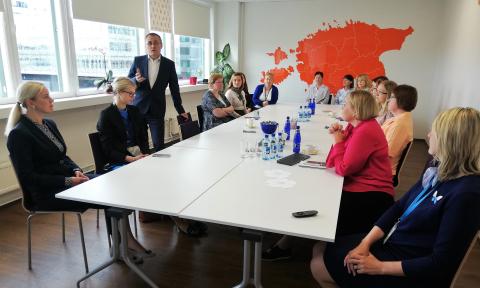
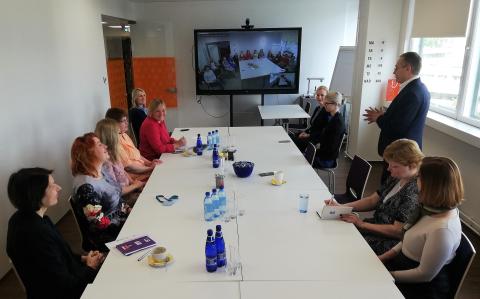
Are places on free Estonian language courses only offered in August?

Jana Tondi, the Head of Language Studies at the Integration Foundation, shares information on the opportunities that are available to study and practise Estonian free of charge – including those that can be taken every day.
What opportunities do we offer to learn Estonian?
Over the years the forms of language-learning that have been offered via the Integration Foundation have evolved and multiplied. That’s primarily thanks to the wide-ranging and very fruitful cooperation with scientific institutes and training companies we coordinate – developments have gone hand-in-hand with the expectations of language learners. Expanding our consultation service to individuals and the launch of the Estonian Language Centres have given us a big push forward as well – face-to-face interaction with language learners makes it possible for us to ensure that the solutions people need are promptly provided.
This year we’re offering opportunities in three main areas:
- language courses, so that people can speak Estonian at the required (and indeed officially recognised) level or gain citizenship;
- language and culture clubs plus language cafes, so that those taking part can polish their Estonian skills through face-to-face communication; and
- a language environment in which people can use the Estonian they’ve learned by taking part in events alongside language providers.
We also recommend that people practise at a time that suits them using free learning materials like Keeleklikk, Keeletee, Speakly, Käänuk and Pille ja Lauri lood.
That’s because the experiences of tens of thousands of language learners have shown us that the desired results are easier to achieve if you combine language-learning formats. You’ll find specific recommendations on our website.
But what about practising Estonian?
We know how important to properly practise a language. That’s why, as the areas outlined above also show, two-thirds of the language-learning opportunities we offer – the language and culture clubs, language cafes and the language environment – guarantee people the chance to practise. For example, anyone interested can attend the language café in Pärnu, or take part in the cultural club programme in Sillamäe, or put their skills to the test in Tartu or on Saaremaa with the support of the Estonian Language Centre.
Are all of these opportunities free of charge?
The only thing participants have to contribute is their time and energy. Running costs are covered by the Ministry of Culture, the Ministry of Education and Research, the Ministry of Finance and the European Social Fund (as part of the ‘Activities supporting integration in Estonian society’ project).
What do you recommend to readers who have been inspired to start studying Estonian straight away?
Your starting point should be your objectives and opportunities – how well you want to be able to speak Estonian and how much time and energy you can dedicate to it.
You can do it on your own, independently. Information along these lines, from general recommendations to the opening hours of the language cafés, can be found on our website. There’s also an easy level test you can take online.
Make the most of the help our consultants offer, too. They’re based in our Estonian Language Centres in Tallinn and Narva. Call them on our free number 800 9999 or e-mail info@integratsiooniinfo.ee.
And what are the myths about learning Estonian that readers should bear in mind?
Quite a many myths have taken root in the almost 28 years since we regained our independence and Estonian has once again been our national language. Together with colleagues and partners we have worked hard to break them – after all, the more people there are who learn a language, the better and clearer the understanding of the language itself.
The most persistent myth, one we’ve worked hard to overturn in recent years, is that the only way of learning Estonian free of charge is on language courses for which admissions only take place in August for those who are quick enough to register.
Sure, we do organise registration for free courses, but not just in August – in January as well. And we offer dozens of other opportunities year-round, from courses at the Estonian Language Centres to the language camps run by our partners.
To find options that suit you, follow the information we put out and make use of the consultation service we offer. Information can be found on our website, on Integratsiooni Sihtasutus /Integration Foundation and Eesti keele maja /Estonian Language Centre social media accounts and in our monthly newsletters. Consultations are available by calling our free number 800 9999 or e-mailing info@integratsiooniinfo.ee.
Where next after Estonian Language Centre first academic year?
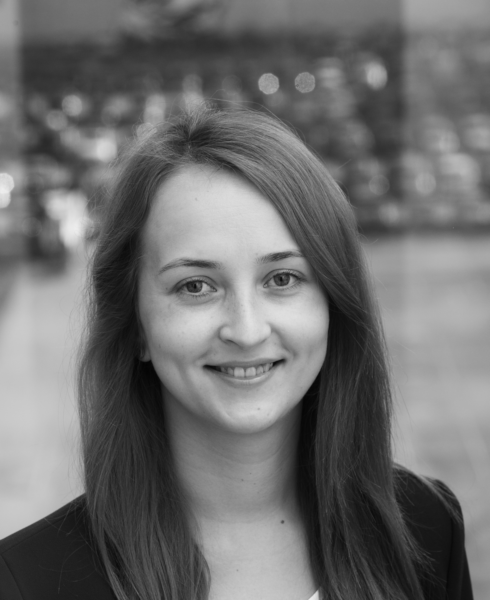
We spoke to Olga Selištševa and Margarita Källo, the directors of the Estonian Language Centre in Tallinn and Narva, about the results of their first academic year and their plans for the year ahead.
In June the first courses and practice groups are coming to an end at the Estonian Language Centre, which opened their doors as centres for studying the national language last September, only to start again with as much enthusiasm this coming autumn.
How many people did your teams serve during your first half-year of operations?
Olga: Almost 700 people found their way to us here in Tallinn during the first six months we were open. 225 are studying Estonian on communication courses. The others have been taking part in the events we’ve been organising to give people opportunities to practise their Estonian, like our film nights, language get-togethers, workshops and language cafés.
Margarita: During the same period a total of 250 people started courses here in Narva. Another 900 have attended events we’ve run to give them Estonian practice. And on top of that there are 1 878 Estonian enthusiasts who’ve sought the advice of our advisors here in Narva and in Tallinn, first and foremost to find a suitable learning format.
How well-known do you think the centres have already become? And what for?
Margarita: Given how active people’s interest has been in the services we offer, I’d say we’ve already got a good reputation and that it’s getting better all the time. On the one hand we’re getting feedback that we’re somewhere to study Estonian that offers interesting learning opportunities and where you can practise the language in a relaxed atmosphere, while on the other we’re being asked by organisations and educational institutions if we can come to them and teach Estonian there.
Olga: From the feedback I’ve heard at language course get-togethers and after language practice events, I’d say we’re well-known and well-respected among those we were created to serve – which is to say people who are interested in learning Estonian. It’s great that both people who have lived here for years and those who have only just arrived know about our services. And it’s great that the feedback we’re getting includes keywords that are important to us, like ‘modern’, ‘diverse learning opportunities’, ‘good advice’ and ‘friendly’.
What have you focussed on so far? And what will you be focussing on next?
Olga: The whole idea of the Estonian Language Centres is to prove that language-learning can be practical, interesting and diverse in its approach. A lot of our students are of the sort who have a certificate they can show as evidence of their language skills but who get stuck because they lack actual, real-life practice. That’s why we’ve turned a lot of our attention to establishing an environment suited to practising the language. We hammer home how important it is to take the right attitude to your studies, including to making mistakes and learning from them, and having the courage to have a go. We’ll certainly keep developing the language practice side of things, since there has been and no doubt will continue to be a lot of interest in it.
Margarita: Attitude is everything – trying to get people interested in Estonian language and culture and sparking the motivation in them they need to learn the language. Communication, too – getting different communities talking to each other, focussing on what they have in common, and creating positive experiences for them. And we’ll be continuing in the same vein.
Who are your doors open to at the centres, and when? How will they benefit from approaching you?
Margarita: Everyone’s welcome! Anyone who has an interest in Estonian language and culture. We do have a bit of a lack of people who speak Estonian as their mother tongue. It’s really useful learning in tandem: someone who speaks Estonian as their first language teaching it to the person they’re paired with, while at the same time learning the English or Russian their partner speaks.
Olga: Students and teachers alike are very welcome here in Tallinn. Like I said earlier, we understand how important it is to provide an environment in which students have the courage to use the language they’ve learnt. If this interview will encourage anyone reading to give the learning in tandem a go, e-mail us your contacts at eestikeelemaja@integratsioon.ee.
Who are you open to help from, and what sort?
Olga: First of all, many thanks to everyone who already helps and supports our team, from the Supervisory Board of the Integration Foundation to those who advertise the Estonian Language Centres. We should be happy that so many people want to work with us, whether they’re volunteers or visitors or partners. To make our operations even more effective though we do want to develop our activities. Any ideas are welcome on that front – just fill the feedback form at latest on 1 July.
Margarita: In Ida-Viru County we definitely need the support and contribution of the Estonian-speaking community. That said, the best results are always achieved by working together, so all of the local governments and organisations in the county could do their bit to make residents aware of what we do at the Estonian Language Centre.
What is needed to learn and practice in Estonian Language Centre?
Margarita: Consult. Our consultations are available by calling our free number 800 9999 or e-mailing info@integratsiooniinfo.ee.
Olga: Stay informed. Information can be found on our website, on Integratsiooni Sihtasutus /Integration Foundation and Eesti keele maja /Estonian Language Centre social media accounts and in our monthly newsletters.
Some impressions from the teachers at the Estonian Language Centre:
- There can be no better recognition for a teacher than successful students. For example, five students from an A1 group at the Estonian Language Centre in Narva decided to take the A2 exam and all passed with flying colours. The best of luck to all of them!
- One of them was so inspired by their results that after completing the A1 level they promised to master A2 during the summer and then start on a B1 course this autumn.
- It’s great when it’s not just me as the teacher who’s getting my jokes! And it’s even better when the students themselves start cracking jokes as well. A fun atmosphere takes the stress out of things and means that people aren’t afraid of making mistakes.
- The Estonian Language Centre in Narva has its own blog and a regular common in the Нарвский рабочий (‘Narva Worker’) newspaper.
- We’re constantly thinking about how to come up with fun language-learning experiences for our students using a variety of active learning methods like workshops, masterclasses, excursions, guest visits and the like. It brings a smile to the face when 100 or so people turn up at Narva Castle in freezing weather to take a cooking class and make something to a traditional Estonian recipe. Or when you all go and watch an Estonian film together and then discussions ensue, in Estonian, in which people from all different backgrounds chime in with the same values. Or when a brain game is held at Narva Art Gallery that showcases 10 amazing places in Estonia to 100 people and all in fluent Estonian!
Events for practicing Estonian we´ve organised: "Vaata Eesti kööki!", "Eesti mäng" and cinema evening.
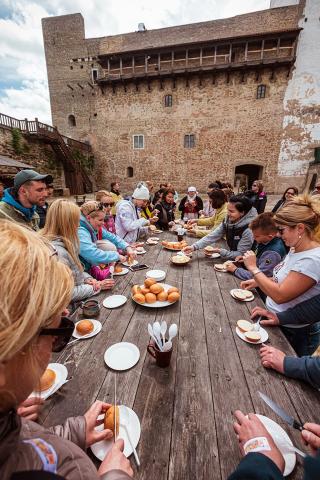
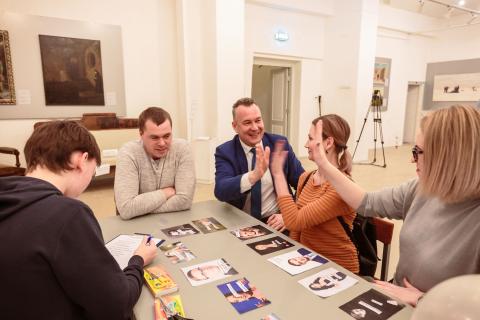
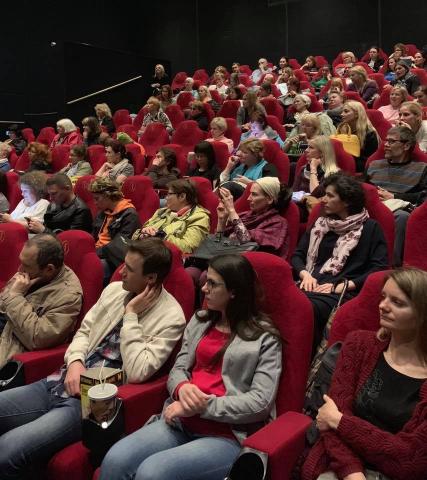
How to make the most of cultural diversity?
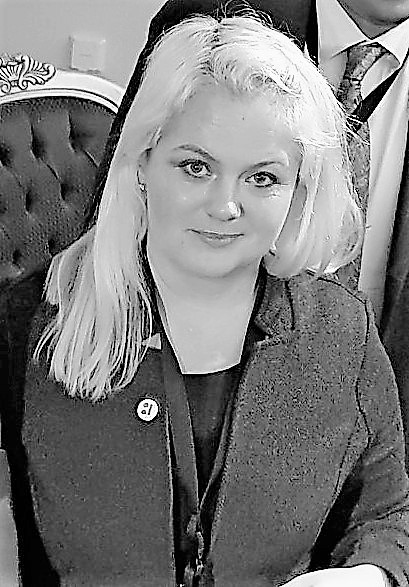
Kaisa Üprus-Tali, an expert on migration and international protection and the head of related services at the Social Insurance Board who has been dealing with the problems of a wide range of people since the mid-2000s and been working to resolve the well-being issues of those who have relocated to Estonia since the migration crisis began, shares her recommendations on how to make the most of cultural differences in everyday life.
In her current position Kaisa has talked to hundreds of people who have sought to relocate and actually relocated to Estonia to live, work and study. In doing so, over the years she has gained unrivalled skills and knowledge that she is happy to share whenever the opportunity arises. Speaking to her this time, we focused on an issue that is becoming part of our everyday lives: how to take cultural differences into account in such a way that both parties win.
Here are Kaisa’s recommendations:
- First and foremost, you have to respect one another, and not just at the level of your cultural differences. Every person is an individual and the differences that arise between people stem from dozens of aspects like your family and how big it is, the customs you follow, your habits and the way things are run in the country you live in. Since we’re speaking frankly, it should be mentioned here that major differences in background of course present more of a challenge to both of the parties seeking to interact with each other, but that’s only natural.
- It’s definitely important to remember that we know what our country is like and what the norms and traditions are, which is why we’re obliged to explain things and guide people accordingly.
- Don’t forget that the further a person’s come to live here and the more removed the cultural space is they’ve relocated from, the harder they’ll have to try to understand us, and the harder we’ll have to try to understand them. It’s also important to bear in mind that your own traditions take on more significance the further away from home you get, particularly in cases where the person in question doesn’t have the opportunity to return to their country or communicate with family and friends who are still there. Not that this is necessarily a bad thing – it’s rather a question of how people can stay true to themselves whilst adapting to and following the norms of their new home.
- For that reason I encourage people to ask questions, because if we don’t know what’s worrying someone, we can’t help them (either settle in or whatever else it might be). These aren’t paint-by-numbers situations. Only the person themselves can say what’s worrying them and why, and based on that you can move forward. A word of warning though: generalising and labelling never lead to a positive outcome, in this context or any other. General knowledge and previous experience are valuable and give you background information, but that can lead you down the wrong path as well.
- True communication’s never one-sided. That’s why we ourselves have to explain things as well, and the more open we are to that, the easier it is to find a lingua franca. In other words, and looking at the other side of what I said a moment ago, if a person doesn’t understand what’s wanted of them, so to speak, it’s very hard for them to know how to respond.
- Moving to another country, even when it’s your own choice to do so, is a huge, life-changing thing. Someone who’s just come to Estonia might try our food and like it, and follow the news here as much as they can, but getting to grips with our language and all the nuances of it can take years. And that applies to everyone. That’s why you should view integration as a journey: it’s about getting used to your new home, which takes time, and you’ve got to give people leeway in that regard. It’s the same in any context – you can never really say that a person is truly ‘done’.
- Nobody can or should be expected to know everything themselves. We’ve been dealing with integration in Estonia since we regained our independence, and we’ve built up the expertise and the experience to advise and assist people on their journey.
If you have any ideas or questions you would like to put to Kaisa, contact her directly by e-mailing kaisa.uprus-tali@sotsiaalkindlustusamet.ee or calling +372 51 80 574.
Our meeting with Kaisa Üprus-Tali.
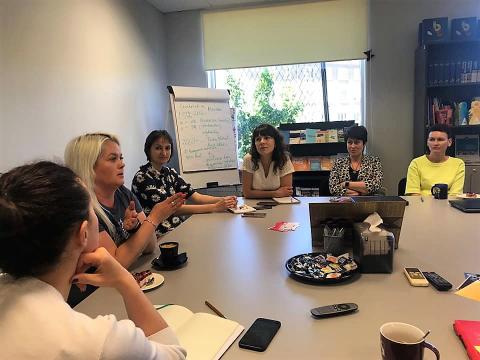
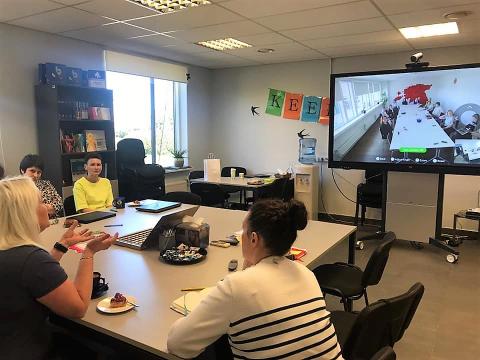
How to study Estonian in beach weather?

Five practical recommendations from Integration Foundation Senior Consultant Kätlin Kõverik.
It pays to take as creative and entertaining an approach to language studies in summer as you do to everything else during the warmer months. The attitude you should adopt is that summer is a time for getting together with people, chatting and socialising, including in the context of language-learning. To this end, here are a few tips on how to go about it.
- Take part in events being run in Estonian. Words and phrases you catch at sports competitions or watching a play can be absorbed into your own vocabulary.
- Explore different parts of the country. Every word you utter, even if it’s just ordering food or buying something in a shop, will give you the courage to utter a few more.
- Tune in to Estonian-language radio stations. Listening to the news and singing along to songs you like are great ways of building up your vocabulary.
- Attend one of our language cafés. An hour-and-a-half spent chatting in Estonian with a dozen or so friendly faces once a week can really add something different to your time off.
- Remember that the consultants at our Estonian Language Centres have advice they can give you about studying the language, whether it’s a board game you can take on a trip away with you and your family or plans you can make to take a course in autumn.
What are these language cafés you mentioned?
The language cafés are a supportive series of get-togethers designed for those who want to speak in Estonian.
A trained group leader guides you through discussions of everyday issues and the participants share their experiences of studying the language independently. To hone your skills you simply need to focus on speaking, understanding what you hear and learning from mistakes.
The café sessions take place on a regular basis at venues that promote relaxed, stress-free communication. Taking part is free of charge and only requires registration in advance.
Sign up for one now! Alongside everything else you do in summer, it will give you the chance to practise your Estonian.
How can I get in touch with the Estonian Language Centre consultants?
Call them on our free number 800 9999 or e-mail info@integratsiooniinfo.ee. Useful information has been gathered together on our consultation site. If you’re only just starting out with Estonian, we can use English or Russian.
Have your say: development of the Estonian Language Centre

The Estonian Language Centre in Tallinn and Narva was opened by the Integration Foundation in September 2018 to offer people the best opportunities for learning and practising Estonian. You can read about how well their first academic year went in this article from our newsletter.
We have already come a long way, but we want to go even further. For that reason we are asking everyone for ideas: what more can the Estonian Language Centre do to ensure that more people speak Estonian?
You can submit your ideas via the feedback form until 1 July (incl).
Everyone who submits an idea will be entered in a prize draw to win Apollo gift card for 30 euros.
Every idea is welcome!
Our calendar
 You can choose events which are organised, assisted or supported by our Foundation to participate at the website event calendar.
You can choose events which are organised, assisted or supported by our Foundation to participate at the website event calendar.
Our news
You can read the latest announcements of our Foundation at our website, Facebook accounts of Integration Foundation or House of Estonian Language.

